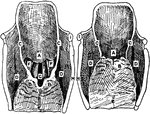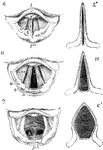Clipart tagged: ‘"vocal cord"’

Larynx is Open and Shut Positions
Upper aperture of the larynx in the open (1) and shut (2) position. Labels: A, cushion of epiglottis;…

Movement of the Vocal Cords
Three laryngoscopic view of the superior aperture of the larynx and surrounding parts. Labels: A, the…